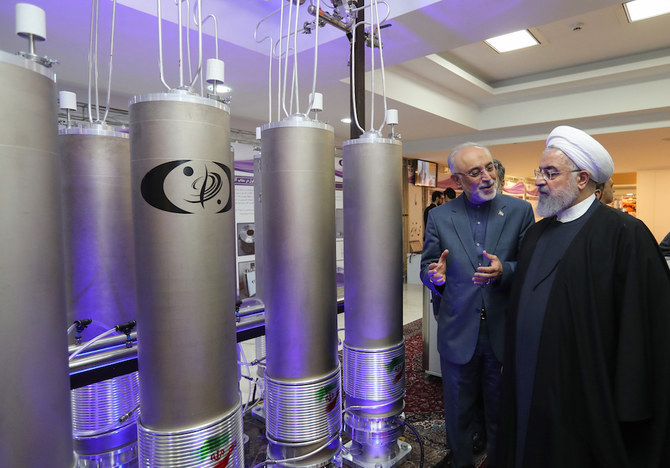VIENNA: Iran has followed through on a threat to accelerate its production of enriched uranium, the head of the UN atomic watchdog said on Monday, departing from his usual guarded language to say he was worried about increasing tension.
Recent weeks have seen US-Iranian confrontation sharply increase, a year after Washington abandoned an agreement between Iran and world powers to curb Tehran's nuclear programme in exchange for the lifting of international financial sanctions.
Washington tightened sanctions from the start of May, ordering all countries and companies to halt all imports of Iranian oil or be banished from the global financial system.
It has also begun discussing military confrontation, dispatching extra troops to the region to counter what it describes as Iranian threats.
Opinion
This section contains relevant reference points, placed in (Opinion field)
Iran has responded with a threat to increase its enrichment of uranium, saying it was up to Europeans who still support the nuclear deal to save it by finding ways to ensure Tehran receives the economic benefits it was promised.
IAEA chief Yukiya Amano, whose agency is responsible for monitoring Iranian compliance with the nuclear deal, said Iran was now producing more enriched uranium than before, but it was not clear when it might reach stockpile limits set in the pact.
"Yes, (the) production rate is increasing," he told a news conference when asked if enriched uranium production had accelerated since the agency's last quarterly report, which found Iran compliant with the nuclear deal as of May 20. He declined to say how much it had increased by.
Iran said last month it was still abiding by the deal but would quadruple its production of enriched uranium - a move that could take it out of compliance if stockpiles rise too far. It demanded European countries do more to shield it from sanctions.
On Monday, Germany's Foreign Minister Heiko Maas became the most senior Western official to visit Iran since the new war of words erupted last month between Washington and Tehran.
"The situation in the region here is highly explosive and extremely serious," Maas told a news conference alongside Iran's Foreign Minister Mohammad Javad Zarif. "A dangerous escalation of existing tensions can also lead to a military escalation."
Zarif blamed the US for the escalation.
"Reducing tension is only possible through stopping the economic war by America," he said. "Those who wage such wars cannot expect to remain safe."
Zarif said talks with Maas were "frank and serious". But he added: "Tehran will cooperate with EU signatories of the deal to save it."
Reduce tensions through dialogue
IAEA chief Amano said he was "worried about increasing tensions over the Iranian nuclear issue". He hoped "that ways can be found to reduce the current tensions through dialogue. It is essential that Iran fully implements its nuclear-related commitments" under the deal.
Washington's European allies opposed its decision last year to abandon the nuclear deal. They have promised to help Iran find other ways to trade, though with no success so far. All major European companies that had announced plans to invest in Iran have since called them off for fear of US punishment.
Iran says the Europeans have not done enough to provide it with alternative ways to trade. Maas acknowledged limits to how much help the European countries can provide.
"We want to fulfil our obligations," Maas said during his joint news conference with Zarif. "We cannot work miracles, but we will try to avert a failure" of the nuclear deal.
Iranian Foreign Ministry spokesman Abbas Mousavi said: "So far, we have not seen practical and tangible steps from the Europeans to guarantee Iran's interests."
France, Britain and Germany have set up a special-purpose vehicle called Instex, designed to allow payments to Iran that would legally bypass sanctions. It has yet to be launched.
"This is an instrument of a new kind, so it's not straightforward to operationalise it," Maas told reporters. "But all the formal requirements are in place now, and so I'm assuming we'll be ready to use it in the foreseeable future."
Washington has denounced the European plans. Diplomats say the system is unlikely to have much impact on commercial trade with Iran but could be used for humanitarian transactions that are permitted under U.S. sanctions.
Washington says the nuclear deal should be expanded to cover other issues including Iran's missile programme and its role in wars in the region. European countries say they share those concerns, although they argue that it would be harder to address them without the nuclear deal in place.
Iran strongly opposes any effort to expand negotiations to cover other issues. Mousavi said as much: "The EU is not in a position to question Iran's issues beyond the nuclear deal."




























